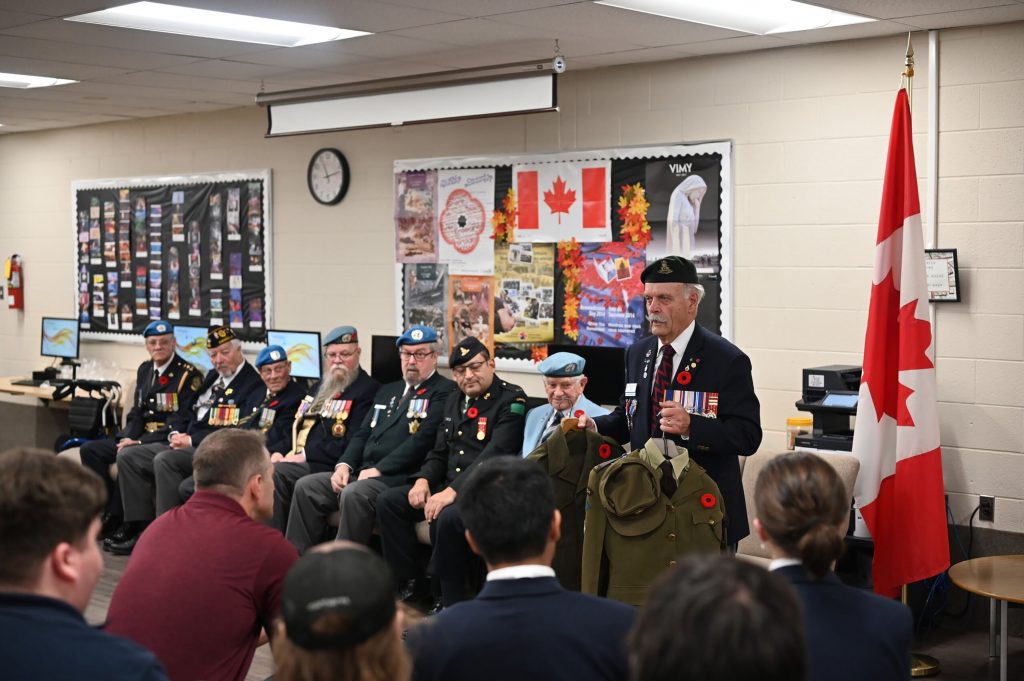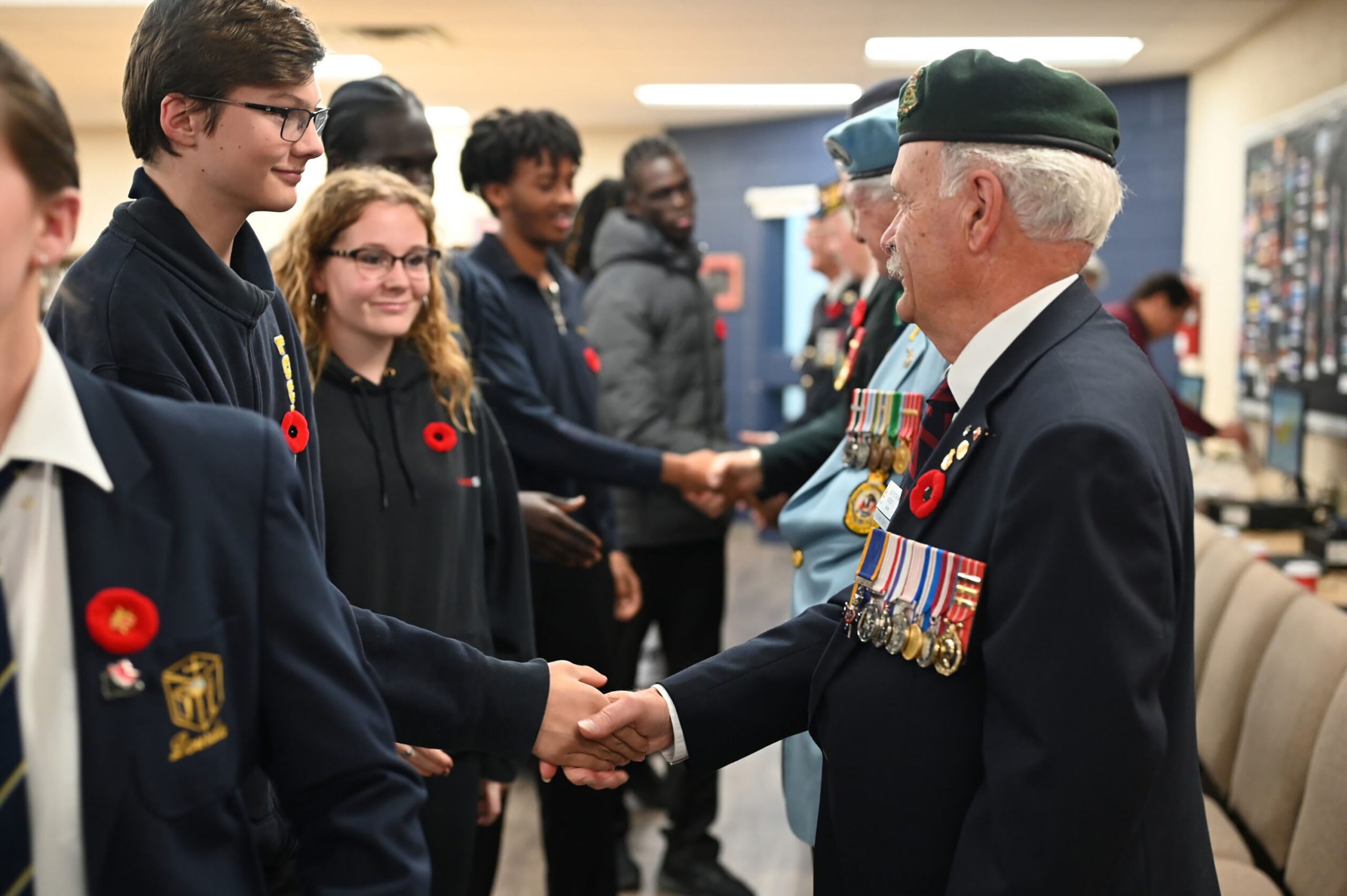GUELPH – Guelph veterans from the navy, United Nations (UN) Peacekeepers and Guelph’s 11th Field Artillery Regiment shared stories at Our Lady of Lourdes Catholic High School on Nov. 9.
Once held in the gymnasium, the event now takes place in the school library; a more intimate setting for the Grade 10 students who participated and are studying law and the First and Second World Wars.
“It’s so important for [students] to talk to a veteran; you can’t get this out of a textbook. You get to see them firsthand and be able to shake their hand,” said former teacher, and the event’s creator, Joe Tersigini.
“The freedom that you have, the human rights that you have [are] because of these gentlemen sitting here,” Tersigini told students, adding, “and there are many women too.”
Tersigini introduced each veteran by name, rank, where they served, and their age when they enlisted.
An empty chair sat at the end of the row where the vets were sitting. Tersigini explained the chair was set there deliberately to represent the soldiers who died.
The panel of eight veterans shared memories evoking both laughter, at the better times, and tears shed over the loss of loved ones.
Sgt. David Noonan served with the U.S. Marine Corps during the Vietnam War, enlisting at 18 years old.
“I served in combat. Some of these gentlemen did, some of them didn’t. But it doesn’t matter, they’re all veterans,” said Noonan, gesturing to those beside him.
“When you sign that paper, you tell your nation you’re willing to give your life for the freedom of others.”
Noonan said he learned how to be a better human being while serving with the marines.
“They taught me differently, they taught me courage, they taught me empathy,” he said.
“There were certain things that happened while I was in service that, well, they weren’t really all that pleasant,” he added, “but I would do it again in a flash if I wasn’t too darn old.”
Cpl. Moe Ferris was a peacekeeper with the UN in Egypt, and enlisted at the age of 17.
Ferris emphasized talking about things people forget during the war, such as families back home.
“I was talking to a father on the radio back and forth, and the father says, ‘I will be home tomorrow,’” said Ferris.
“And they ship them home in the box.”
He explained the child of the father, and his wife, would go through trauma as well for losing a loved one.
He emphasized that wars affect more than the soldiers.
“What he did, he did to help to get freedom in this world,” he added.
Rifleman Jacques De Winter was a UN peacekeeper who served with the second regiment in Cyprus, enlisting at 19 years old.
“I spent six months in Cyprus on a peacekeeping mission in [1965] to keep the Greeks and the Turks from killing each other,” said De Winter.
His first deployment was just outside Nicosia, Cyprus’ capital.
His second deployment was to Cyprus’ north.
“Canadians can be rightfully proud of our reputation around the world for being a force for peace, but this resolve comes at a steep cost,” De Winter said.
“Approximately 125 Canadian personnel have died in the course of our country’s peace efforts.
“In Cyprus, 28 peacekeepers gave their lives paying the ultimate price in our country’s efforts to help the people of that nation,” he said.
Craftsman Ted Ford was just 17 years old when he enlisted with the Corps of Royal Canadian Electrical and Mechanical Engineers.
He attended John F. Ross High School in Guelph for two years before dropping out to join the army.
Ford spoke about being in a workshop when his sergeant at the time said, “Those who wish to go or would like to go to Egypt, [take] one step forward.”
“Well, my left foot went out, and I’d be darned, my right foot followed,” he said.
Ford was a vehicle mechanic whose main objective was to simply, as he said: “keep the wheels rolling.”
Ford said he served for four years before returning to Canada.
On his monthly leaves, he would return to London, Ontario.
“That was the biggest mistake I’ve ever made in my life, was to get out,” Ford said.
“If anybody wants to join, join; it’s a great life.
You learn a lot of both yourself and a lot of other people,” he told students.
Sgt. Maj. James Stoneburgh, or “Big Jim” as he was known, served with the 11th Field Artillery Regiment in the Canadian Army and has his Canadian Forces Decoration.
He enlisted at the age of just 15 years old, which caused some students’ jaws to drop in shock.
Stoneburgh described what it was like in Egypt as a peacekeeper, still having to complete his job during sand storms and bad weather.
Once he was driving during a sandstorm, students heard, and the windy weather uncovered land mines.
“When I looked at that stuff, my stomach just sank because we’d come right through the middle of this minefield, unaware of it,” said Stoneburgh.
“There’s no preparation in school for this stuff, you just got to learn fast.
“You learn on the run and you just do your job and you get it done,” he said.
Sgt. Maj. Edwin Haugen served with the Royal Canadian Artillery 11th Field Regiment as a reservist.
He was appointed Deputy Sgt. Maj. of the 31 Canadian Brigade Group, and is with the brigade headquarters.
“As a reservist, you can do lot, and you can commit to a lot of things, and we have a lot of guys who decide to go regular force,” said Haugen.
Haugen also spoke about a friend who died by suicide while serving in the former Yugoslavia “during the bad times.”
“Remembrance Day means something special, because it happens, some people have baggage and that’s something important to realize that when you put [on your uniform] and you serve, you have demons,” Haugen said.
“That’s why it’s important that we take that into account, so that we always support each other.”
Sgt. Michael Seitz was a peacekeeper in Egypt, and served with UN and NATO forces.
Seitz spent 26 years in the air force and in various parts of the world.
He spent two years serving with the UN in Egypt and told students about the beginning of the Six-Day War in 1967.
“Had we been there, this in all likelihood would have not happened,” said Seitz.
“United Nations, it does work,” he added.
“When you have forces that are opposing evil, it works … What we have done, I think it’s worthwhile.”
Capt. Rod Pettigrew began his service with the 11th Field Artillery Regiment at 16 years old.
He is a Member of the Order of Military Merit, and has recieved a Canadian Forces Decoration.
Pettigrew wanted to go to Vietnam but was not able to without the signature of his mother, which she refused to provide.
He eventually progressed up the ranks to Sgt. Maj. for all units in Ontario.
“That was quite a feat,” he remarked.
The veteran brought a “meal, ready-to-eat,” also known as an “MRE,” consisting of dehydrated food and cans that were given to soldiers.
He also passed around a photo of himself and his wife taken before they married.
The photo encapsulates both in uniform, which he brought to show the students.
At the end of the panel the students had an opportunity to ask the veterans questions, and the students shook hands with each of them.

Here, Captain Rod Pettigrew holds up a men and women’s uniform from WWII to show the group of students who attended the panel. Submitted photo




